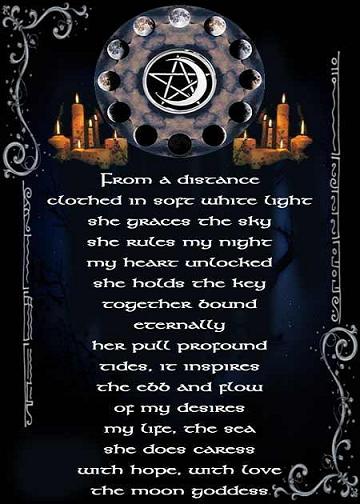Blessed be everyone,
I found this little article in the DailyOM yesterday and I wanted to share it with you all. I believe it kind of goes along with that last post about 'taking it easy'. Anyway, it is a pretty good article and I hope that you will all enjoy it.
*************************************************************************************
From "Slowing Down to the Speed of Life: How To Create A More Peaceful, Simpler Life From the Inside Out" by Richard Carlson & Joseph Bailey
Posted by: DailyOM
As young children we were full of life, always playing or running around with our friends. We would turn from one activity to another with endless enthusiasm. Games of hide-and-seek were an opportunity for unlimited imagination, exploration, and curiosity. It seemed we never got bored or tired of whatever we were doing in the moment. For the most part, our childhoods were an endless series of positive feelings--joy, laughter, curiosity, surprise, confidence, and adventure. We had not learned yet to worry, to hold grudges, or to have regrets about the past.
Most young children, in fact, are generally unstressed, full of awe and curiosity, and rarely bored. Most have enormous amounts of energy, are unconditionally loving, and seem to have boundless energy that make adults envy their innocent approach to life. These uncontaminated children live from a state of mind that we practitioners of Psychology of Mind like to call mental health. They live naturally in the moment.
As adults we still have the capacity for mental health, but we have been socialized into the busy ways of Western culture, and many of us have grown serious, analytical, stressed, depressed, and unimaginative. Beginning when we reach age five or six, and steadily progressing into adulthood, our experience of mental health declines. This decline seems to correspond with our propensity to use memory and analytical thinking more often as we get older and our creative, in-the-moment thinking less often.
As you will see, it is not only unnecessary but actually unnatural for human beings to lose this experience of mental health. It is only through a lack of understanding about the nature of our psychological functioning that this deterioration occurs. Understanding how to maintain this natural mental well-being and our capacity to live in the moment is what practitioners of pom generally call wisdom or maturity
Mental Health, Toolkit of the Mind
Mental health is our birthright. We don't have to learn how to be mentally healthy; it is built into us in the same way that our bodies know how to heal a cut or mend a broken bone. Mental health can't be learned, only reawakened. It is like the immune system of the body, which under stress or through lack of nutrition or exercise can be weakened, but which never leaves us. When we don't understand the value of mental health and we don't know how to gain access to it, mental health will remain hidden from us. Our mental health doesn't really go anywhere; like the sun behind a cloud, it can be temporarily hidden from view, but it is fully capable of being restored in an instant.
Mental health is the seed that contains self-esteem--confidence in ourselves and an ability to trust in our common sense. It allows us to have perspective on our lives--the ability to not take ourselves too seriously, to laugh at ourselves, to see the bigger picture, and to see that things will work out. It's a form of innate or unlearned optimism. Mental health allows us to view others with compassion if they are having troubles, with kindness if they are in pain, and with unconditional love no matter what they believe, how they act, or what their nationality or religion happens to be. Mental health is the source of creativity for solving problems, resolving conflict, making our surroundings more beautiful, managing our home life, or coming up with a creative business idea or invention to make our lives easier. It gives us patience for ourselves and toward others as well as patience while driving, catching a fish, working on our car, or raising a child. It allows us to see the beauty that surrounds us each moment in nature, in culture, in the flow of our daily lives.
Although mental health is the panacea for living our lives, it is nothing short of ordinary. If you reflect on your life, you will see that it has been there to direct you through all your difficult decisions. It has been available even in the most mundane of life situations to show you right from wrong, good from bad, friend from foe. Mental health has commonly been called conscience, instinct, wisdom, common sense, or the inner voice. We think of it simply as a healthy and helpful flow of intelligent thought. As you will come to see, knowing that mental health is always available and knowing to trust it allow us to slow down to the moment and live life happily.
Six Reasons Why it is Critical; to Slow Down to the Speed of LIfe
Reduction of stress
Improved physical health
More present, intimate, and loving relationships
Heightened sensory awareness and enjoyment of the natural beauty around us
Greater peace of mind and serenity
Dramatically improved ability to be productive and creative and to stay focused
Unleashing Innate Human Potential
Mental health is an innate capacity that is complete in itself. It is the human potential for healthy psychological functioning--self-esteem, creativity, insight, wisdom, unconditional love, healthy relationships, motivation, humor, problem solving, optimism, and many more virtues. It lies dormant in each human being in its complete form, waiting to be unleashed.
You can think of innate mental health as a one-hundred-watt lightbulb, burning constantly and consistently. The light that we see in our lives is limited by the aperture of our thinking in the moment. We may live in total darkness most of the time and have only a momentary glimpse of this light. We call this flash of light an insight, a peak experience, or a moment of happiness. As we gain more understanding of how our mind and life work, this aperture stays open farther and farther, exposing more of the light of our innate mental health. Though our mental health will fluctuate with our moods and our thoughts, the source of the light we see remains constant. As we mature, we realize more of this innate mental health in our lives. The power of this innate mental health is the unlimited human potential to live a happy and productive life.
Living in the Moment, Entry Point
into Healthy Functioning
The entry point into healthy psychological functioning is living in the moment. But what does being in the moment really mean? We all have experienced living in the moment many times--during a crisis, being struck by the beauty of a sunset or some other natural phenomenon, falling in love, taking a shower, listening to music, hearing an inspiring speaker. During these moments, time seems to stand still and the buzz of our personal thinking briefly subsides. We see life firsthand, for we have slowed down to the speed of life. These rare moments have the ability to reduce our stress, give us hope, and fill us with joy and inspiration.
The key to making these apparently serendipitous moments the norm for our daily lives is to understand that our experience of life is directly linked to the way we are thinking. Your thought process can be either healthy or unhealthy, a topic we will discuss in great detail a little later. Knowing the difference between healthy and unhealthy thinking is one of the most important insights you can gain about your mental health.
Thought, the Creator of Experience
Thought is the power that creates human experience--the ultimate force that creates, shapes, and transforms our lives. We create our experience of life through our thinking. We can't have an experience without thought. It's as though thought is the ink in the pen of life, and we are the illustrators. What we think becomes our emotions, perceptions, sensations, decisions, behavior. It also influences the reactions we get from others and our interpretations of those reactions. Without thinking, there would be no experience. The tree may fall in the woods, but someone alive and conscious needs to experience it. We are not saying that our thinking creates the outside world in any absolute sense--the tree still falls even if we don't experience it--but our thinking does create our experience of the event.
It's impossible to experience any negative feeling without first creating a negative corresponding thought. The truth is, our thinking will always create the reality we perceive. For example, when we see life as being full of demands and we feel overwhelmed, our thoughts coincide with this view of life. When we are impatient, we are thinking impatient thoughts: "When is he going to call me back for that order?" When we are stressed, we are thinking stressed thoughts: "I hate my supervisor. He demands a ridiculous amount out of me. Does he think I'm Superwoman?"
The foregoing is excerpted from Slowing Down to the Speed of Life by Richard Carlson, and Joseph Bailey.
Welcome to my online Book of Shadows.
A good place to come and learn from and share with like-minded Pagans and Wiccans of all Traditions.

glitter-graphics.com

glitter-graphics.com
Wiccan Rede
Subscribe to:
Post Comments (Atom)
Live Traffic Feed
Being

Breath

Courage

Fight for Freedom
Earth Air Fire Water

Talisman
Spellwork
Moon Goddess
Moon Phases
CURRENT MOON





































1 comment:
Hecate,
I'm glad you liked my BOS Audit post! I'd be happy to share it and let you post it to your blog. Thanks again!
Garnet
Post a Comment